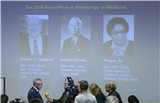Only trade growth will define merits of TPP
Updated: 2015-10-08 07:38
(China Daily)
|
||||||||
 |
|
Trade ministers of the United States and 11 other Pacific Rim countries attend a press conference after negotiating the Trans-Pacific Partnership (TPP) trade agreement in Atlanta, the United States, on Oct. 5, 2015. Trade ministers of the United States and 11 other Pacific Rim countries "have successfully concluded" the Trans-Pacific Partnership (TPP) free trade talks, U.S. Trade Representative Michael Froman said Monday. [Photo/Xinhua] |
At a critical moment when trade is set to grow less than the global economy for the first time in the last four decades, there is no reason not to welcome the ambitious pact that 12 Pacific Rim countries reached on Monday to create the largest free trade area of the world.
That is why China's Ministry of Commerce said on Tuesday that the Trans-Pacific Partnership is one of the key free trade agreements for the region and China is open to any mechanism that follows the rules of the World Trade Organization and can boost the economic integration of the Asia-Pacific.
As a top global trading power that has hugely contributed to and benefited from the global trade growth for the last two decades, China sincerely hopes the TPP pact and other free trade arrangements in the region can strengthen each other and boost trade, investment and economic growth in the Asia-Pacific, to benefit not just the region but also the rest of the world.
It is also the common wish of the international community that, as a long-term driving force, the current slow pace of global trade growth should be revived through deeper and wider reforms of the international trade system to fuel a sustainable global recovery from the 2008 financial crisis.
The appealing promise that the TPP may reshape industries and liberalize commerce in 40 percent of the world's economy has understandably given rise to praise such as the "most ambitious trade pact in a generation".
Yet the real implications of the TPP deal are far from clear since it has been largely negotiated under a blanket of secrecy to facilitate give-and-take among the signatories.
The power of a successful trade deal is to maximize as much as possible each participant's comparative advantages in global trade while minimizing predictable political opposition from various domestic vested interests.
Nevertheless, even before the five-year marathon talks have secured a really workable arrangement, US President Barack Obama hastened to paint the pact as a way of stopping China from writing the rules of the global economy in an illusion that he may easily win over the domestic political support he expects.
However, if the deal is based on the political priority of one partner, rather than the shared benefit of all partners, it would be hard to believe that it can ensure free market trade as it is being touted.
The world needs a trade-boosting deal. The United States has a huge onus to prove the merits of the TPP.
- Russian warplanes hit IS targets in Syria
- Senior US envoy to visit Japan, S Korea, China
- Russia, US agree to cooperate in solving Syria crisis: Russian FM
- Iranian President calls Iran deal victory over war
- LatAm experts praise Xi on yuan, globalization
- Evidence found of summertime water flows on Mars: study
-
 Rising yuan use may lift IMF basket prospects
Rising yuan use may lift IMF basket prospects 
 China wins first Nobel in medicine
China wins first Nobel in medicine-
 Gary Locke: Candor key to relations
Gary Locke: Candor key to relations -
 Saving Chinese folk songs
Saving Chinese folk songs 
 Candlelight vigil for Oregon shooting victims
Candlelight vigil for Oregon shooting victims
 Chinese people's pursuits in different eras
Chinese people's pursuits in different eras
 Ten highlights from Xi's trip to US and UN
Ten highlights from Xi's trip to US and UN
 Top 10 life-changing benefits from Xi's US visit
Top 10 life-changing benefits from Xi's US visit
Most Viewed
Editor's Picks

|

|

|

|

|

|
Today's Top News
Tu first Chinese to win Nobel Prize in Medicine
Huntsman says Sino-US relationship needs common goals
Xi pledges $2 billion to help developing countries
Young people from US look forward to Xi's state visit: Survey
US to accept more refugees than planned
Li calls on State-owned firms to tap more global markets
Apple's iOS App Store suffers first major attack
Japan enacts new security laws to overturn postwar pacifism
US Weekly

|

|








